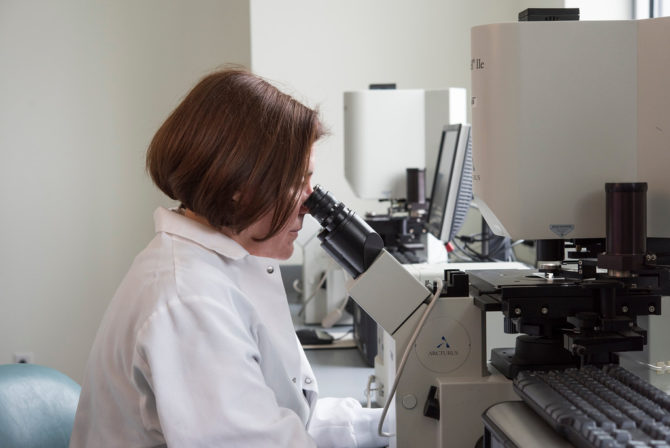
Co-Directors: Lance Liotta, MD, PhD, and Emanuel Petricoin III, PhD
Phone: 703-993-9526 | Email: [email protected]
Research Focus
The Center for Applied Proteomics and Molecular Medicine has expertise in proteomics, medical technologies, pathology, cancer research, and medical diagnostics. The team’s research portfolio addresses cancer and other debilitating diseases through early diagnosis, prevention, individualized therapy, and the development of new treatments. CAPMM’s mission is to study diseases and translate their discoveries for patient benefit in ongoing and future clinical trials.
CAPMM invents new technologies to ask and answer questions that could not be explored previously. They utilize these novel technologies to investigate protein signaling activity, identify the location of protein-protein interactions, discover biomarkers, and develop medical diagnostics.
CAPMM has a unique resource of invented technologies.
■ TheraLin® Tissue Fixative (commercialized by Grace Bio Labs and exclusively licensed to Theranostics Health, Inc.) preserves cell morphology and stabilizes tissue biomolecules in one step for reliable protein signaling analysis.
■ Laser Capture Microdissection (LCM) is used to isolate a pure population of cells under direct microscopic visualization from heterogenous tissue sections or cell culture.
■ Reverse Phase Protein Array (RPPA) is a multiplexed immunoassay that can quantitatively measure hundreds of proteins and post-translationally modified proteins from limited number of cells or a fraction of a biopsy to elucidate signaling pathway activity.
■ The Nanotrap® nanoparticles (exclusively licensed to and sold by Ceres Nanosciences Inc.) concentrates and protects potential rare disease biomarkers directly from blood, urine and saliva samples. Nanotrap® nanoparticles are analyzed using standard platforms including mass spectrometry, ELISA, Reverse Phase Protein Microarrays and Western Blotting. The technology can also be on other molecules of interest and develop point of care diagnostics. Preliminary data indicates the technology could also serve as a vehicle delivery method.
■ Protein painting coats interacting proteins/ligands with chemical dyes. The biomolecules can be analyzed by mass spectrometry to determine the precise location of protein-protein interactions and thereby inform drug development.
Facilities and Equipment
■ CAP/CLIA Certified Laboratory
■ Laser Capture Microdissection Instruments
■ Microarray Printing Platforms
■ Immunohistochemistry Autostainers
■ Mass Spectrometers
Select Publications
